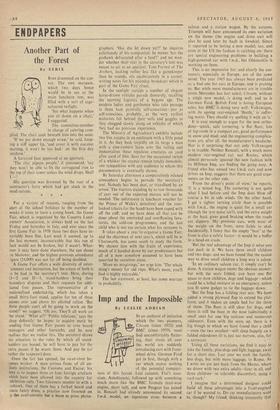ENDPAPERS
Another Part of the Forest
By STRIX
RAIN drummed on the can- vas. The vast marquee, which two days hence would be in use as the main luncheon tent, was filled with a sort of sage- coloured twilight.
'See what happens when you sit down on a chair,' I suggested.
The committee-member in charge of catering com- plied. The chair sank beneath him into the ooze. `If we put down enough straw,' he said, keep- ing a stiff upper lip, 'and cover it with coconut matting, it won't be too bad: on the first day anyhow.'
A harassed face appeared at an aperture.
The clay pigeon people,' it announced, 'say they won't be able to fix the corrugated iron to the top of their tower unless the wind drops. Shall —' His question was drowned by the roar of a contractor's lorry which had got stuck in the mud outside.
For a variety of reasons, ranging from the start of the school holidays to the number of weeks it takes to train a young hawk, the Game Fair, which is organised by the Country Land- owners' Association, is always held on the last Friday and Saturday in July, and ever since the first Game Fair in 1958 those two days have in- variably been fine. Last week it seemed, up to the last moment, inconceivable that this run of luck would not be broken, but it wasn't. What- ever it may have done elsewhere, the sun shone on Shotover, and the highest previous attendance igure (24,000) was not far off being doubled.
A Game Fair offers a wide diversity of enter- 'ainment and instruction, but the cream of both is .o be had in the secretary's tent. Here, during D-2 and D-1, stand-holders bring their boundary disputes and their requests fo•r addi- tional free passes. The representative of a nationalised undertaking, which has taken a small thirty-foot stand, applies for ten of these passes over and above his allotted ration. 'But these people can't all be going to work on the stand?' we suggest. 'Oh yes. They'll all work on the stand.' What at?', 'Public relations,' says the chap defiantly; he hopes to acquire merit by sending free Carrie Fair passes to area board managers and other hierarchs, and he now realises that we realise this. The secretary draws his attention to the rules by which all stand- holders are bound; he will have to pay for the extra passes if he wants them. And pay he (or rather the taxpayer) does.
Once the fair has opened, the va-et-vient be- comes brisker. A man arrives from, of all un-
lkely institutions, the Customs and Excise; his luty is to inspect three or four foreign artefacts ,vhich have been allowed into the country for .xhibition only. Two falconers saunter in with a ;oshawk. One of them has a forked beard and rears fancy dress, a practice now frowned on ry the confraternity but a boon to press photo-
graphers. 'Has she let down yet?' he inquires solicitously of his companion; he means 'has the goshawk defaecated after a feed?' and we won- der whether their visit to the secretary's tent was meant to act as an aperient. Tom Forrest of The Archers, looking rather less like a gamekeeper than he sounds, sits unobtrusively in a corner, writing notes for his noonday broadcast which is part of the Game Fair ritual.
In the sunlight outside a number of elegant horse-drawn vehicles parade demurely, recalling the sporting logistics of a bygone age. The modern ladies and gentlemen who take passage in them look painfully self-conscious—just , as self-conscious, probably, . as the very earliest motorists felt behind their veils and goggles as they chugged slowly along on vehicles of which they had no previous experience.
The Ministry of Agriculture's exhibits include two live coypus in an enclosure with a little pond in. it. As they bask torpidly on its verge a man with a cine-camera leans over the railing and immortalises these repulsive creatures on yard after yard of film. Save for the occasional twitch of a whisker the coypus remain totally immobile; one sympathises with any audience to whom this documentary is eventually shown.
By Saturday afternoon a comparatively relaxed atmosphere begins to pervade the secretary's tent. Nobody has been shot, or transfixed by an arroiv: The tractors standing by to tow thousands of cars out of the expected morass will not be needed. The unforeseen (a luncheon voucher for the Prince of Wales's. detective) and the over- looked (chairs for the band) have been coped with off the cuff; and we have done all that can be done about the overtaxed and overflowing lava- tories, the sold-out programmes, and the lost child who is not too certain what his surname is.
It takes about a year to organise a Game Fair, and the chairman of next year's, which will be at Chatsworth, has come south to study the form. We shower him with the fruits of experience, much of it handed down by our predecessors but all of it now somehow assumed to have been quarried by ourselves alone.
`Have no misgivings,' we urge him. The whole thing's money for old rope. What's more, you'll find it highly enjoyable.'
The last statement, at least, has some warrant in probability.






























 Previous page
Previous page